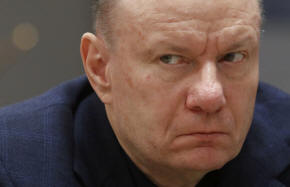Potanin seen as major obstacle to Russian $60bn metal merger
 Send a link to a friend
Send a link to a friend
 [July 06, 2022] By
Clara Denina and Pratima Desai [July 06, 2022] By
Clara Denina and Pratima Desai
LONDON (Reuters) - Russian businessman
Vladimir Potanin is likely to be the biggest barrier to a potential $60
billion merger between Russia's largest metals producers Nornickel and
Rusal, two sources with direct knowledge of the matter said.
Potanin has said a tie-up could strengthen the companies' defences
against any sanctions the West might impose on them, and in an interview
with Russian media indicated he would not step down as CEO.
The two sources, asking not to be named because of the sensitivity of
the issue, said any deal was unlikely as long as Potanin remained
Nornickel's boss and major shareholder.
"Until he bites the bullet, steps down as CEO and sells down his stake
to become a minority shareholder, no deal is possible," one of the
sources said.
"Even if the companies are not under international sanctions, there will
be a de facto global international finance ban on them as a result of
the UK sanctions on Potanin".
Britain last week placed sanctions on Potanin.
Neither company has been directly targeted by Western sanctions imposed
on Russia over the war in Ukraine, but Rusal was subject to U.S.
sanctions between April 2018 and early 2019 until its founder Oleg
Deripaska agreed to relinquish control.
The Interros Group, which manages Potanin's assets, and Rusal's majority
shareholder EN+ Group did not comment. Rusal did not respond to a
request for comment.
Rusal is the world's largest aluminium producer outside China, while
Nornickel's palladium and nickel account for 40% and 7% of global mined
supplies respectively.
Adding weight to Potanin's comments in this week's interview that a
merger could offer shelter from sanctions, analysts say the combined
clout of the two companies, most of whose customers are in Europe and
the Americas, would leave the West wary of sending prices soaring for
metals that are critical to its own industries.
[to top of second column] |

Vladimir Potanin, co-owner of Norilsk Nickel, attends an agreement
signing ceremony with the Krasnoyarsk region's government, in
Moscow, Russia December 12, 2017. REUTERS/Sergei Karpukhin

Already energy prices have hit record levels in Europe following the West's
efforts to wean itself off Russian gas.
The London Metal Exchange is looking into what UK sanctions on Potanin mean for
it, its participants and for Nornickel's brands traded on the bourse.
INTERTWINED AND EDGY
The two producers are intertwined because Potanin and Rusal own 36% and 26%
respectively of Nornickel.
Relationships between the two sides, however, have long been marked by disputes
and it is unclear whether a new agreement can be reached on dividend payouts
once the existing deal expires on Jan. 1, 2023.
"A merger could discourage Nornickel from paying dividends in the coming years,"
said Kirill Komarov, an analyst at Tinkoff Investments.
Potanin, Rusal and other Nornickel shareholders in 2012 signed the existing
10-year agreement on the size of the payouts to end a previous long-standing
dispute.
A third source with direct knowledge said they were unaware talks were taking
place and that Potanin's interview was posturing ahead of negotiations to
replace the dividend payment agreement once it expires.
(Reporting by Clara Denina and Pratima Desai; editing by Barbara Lewis)
[© 2022 Thomson Reuters. All rights
reserved.]This material may not be published,
broadcast, rewritten or redistributed.
Thompson Reuters is solely responsible for this content.
 |